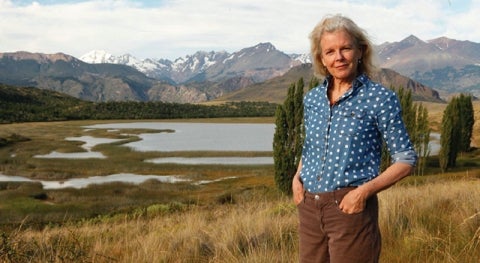Note: Yale School of the Environment (YSE) was formerly known as the Yale School of Forestry & Environmental Studies (F&ES). News articles and events posted prior to July 1, 2020 refer to the School's name at that time.

Decades ago, Kristine and Doug Tompkins built businesses, including The North Face and Patagonia clothing brands, which reflected their environmental ethics. In addition to being models of corporate responsibility they were also incredibly successful.
So successful, in fact, that by the early 1990s the couple was able to move to southern Chile to focus their time and wealth on protecting the natural world. Over a quarter-century, until Doug’s death last year, they acquired more than 2.1 million acres of land for permanent conservation, including Pumalín Park, a 715,000-acre piece of Chilean rainforest considered the largest privately held preserve operated as a public park.
But now Kristine Tompkins, who will visit Yale this week, and her conservation organization, Conservacion Patagonica, are entering a critical new phase. Earlier this year she donated nearly 1 million acres of land to the Chilean government and another 370,000 acres to Argentina on the condition that they be used to create national parks that are open to the public.
On Wednesday, April 27, Tompkins visited Yale to address why she believes national parks are so important to biodiversity, people, and the planet. She also discussed her organization’s goal of donating three national parks to the Chilean government and why National Parks are the best choice for conserved land in Patagonia.
The talk, “Managing the World’s Largest Land Donation,” was held in Burke Auditorium, Kroon Hall.
So successful, in fact, that by the early 1990s the couple was able to move to southern Chile to focus their time and wealth on protecting the natural world. Over a quarter-century, until Doug’s death last year, they acquired more than 2.1 million acres of land for permanent conservation, including Pumalín Park, a 715,000-acre piece of Chilean rainforest considered the largest privately held preserve operated as a public park.
But now Kristine Tompkins, who will visit Yale this week, and her conservation organization, Conservacion Patagonica, are entering a critical new phase. Earlier this year she donated nearly 1 million acres of land to the Chilean government and another 370,000 acres to Argentina on the condition that they be used to create national parks that are open to the public.
On Wednesday, April 27, Tompkins visited Yale to address why she believes national parks are so important to biodiversity, people, and the planet. She also discussed her organization’s goal of donating three national parks to the Chilean government and why National Parks are the best choice for conserved land in Patagonia.
The talk, “Managing the World’s Largest Land Donation,” was held in Burke Auditorium, Kroon Hall.
Kristine Tompkins Video
Her leadership has been key in the recent evolution of the environmental movement in [Chile].
The Tompkins chose to focus their conservation in the Patagonia region, as well as the Ibera marshlands region of northern Argentina, because they offered a rare opportunity to implement bold, large-scale projects to sustain biodiversity.
While some of the their acquisitions triggered controversy — including complaints that decisions did not incorporate local stakeholder input — their work to protect land in the face of multiple ecological threats has also earned wide acclaim.
“Kristine Tompkins is probably one of the world’s most influential conservationists,” said Martin Becker ’16 M.E.M., a Chilean native who is helping to coordinate the F&ES event. “She is leading the largest private-land donation ever given to any country to establish the future Pumalín, Iberá and Patagonia National Parks.
“Beyond wildlands conservation she has strongly promoted environmental activism, building support to stop big hydroelectric projects in the Chilean Patagonia. Her leadership has been key in the recent evolution of the environmental movement in my country.”
While some of the their acquisitions triggered controversy — including complaints that decisions did not incorporate local stakeholder input — their work to protect land in the face of multiple ecological threats has also earned wide acclaim.
“Kristine Tompkins is probably one of the world’s most influential conservationists,” said Martin Becker ’16 M.E.M., a Chilean native who is helping to coordinate the F&ES event. “She is leading the largest private-land donation ever given to any country to establish the future Pumalín, Iberá and Patagonia National Parks.
“Beyond wildlands conservation she has strongly promoted environmental activism, building support to stop big hydroelectric projects in the Chilean Patagonia. Her leadership has been key in the recent evolution of the environmental movement in my country.”
– Kevin Dennehy kevin.dennehy@yale.edu 203 436-4842
Published
April 25, 2016